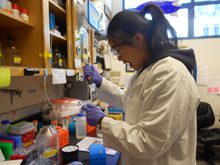Rebecca Yue L&S Sciences
Identifying Dsb Substrates of the Type III Secretion System in Salmonella enterica
Salmonella enterica is a bacterium that causes major food borne disease in the world. It infects people by inducing the uptake of the bacteria by secreting proteins into cells in the host’s intestines. A crucial system of Salmonella enterica pathogenesis is the Type III Secretion System (T3SS) which transports bacterial proteins into host cells. Previous experiments indicate that the Disulfide Bond Formation (Dsb) System is needed for the Type III Secretion System. However, a direct interaction between the two systems is not currently known. Through molecular cloning and a bacterial two-hybrid system, we can determine if there is a relationship between the proteins in the T3SS and proteins in the Dsb system. A better understanding of the interaction between these two systems may provide more insight to the pathogenesis of Salmonella enterica, and further analysis can lead to the identification of potential proteins for antibacterial targets as well as potential strains for vaccine candidates.
Message To Sponsor
The Summer Undergraduate Research Fellowship grant has provided me with the resources for me to wholeheartedly focus on research that I am passionate about. Additionally, the program will allow me to maximize my learning from mentors and other experienced researchers in a professional research environment. As a SURF scholar, I hope to further develop my skills as a scientist and challenge myself as an independent researcher. I am excited and a bit nervous about successfully carrying out my own research project, but I am very grateful for the help and support from the SURF community.